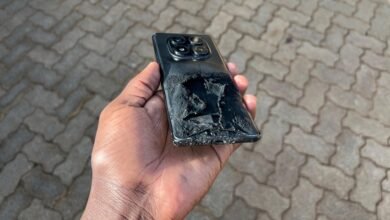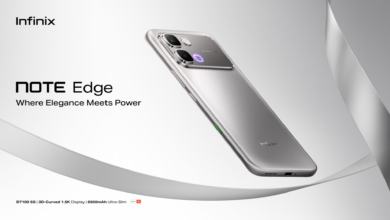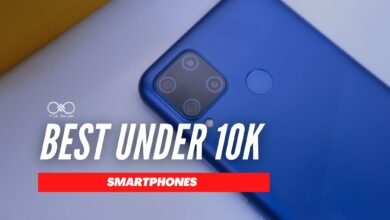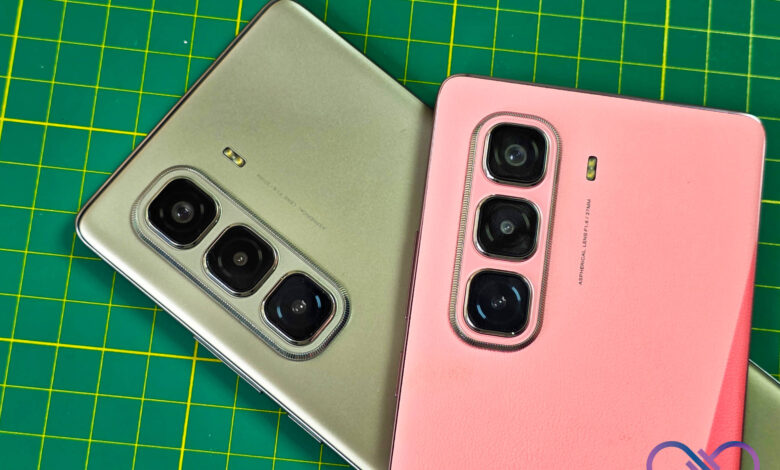
The Infinix HOT 50 Pro+ and Xiaomi Redmi Note 14 4G are two of the most talked-about mid-range smartphones in Kenya right now. Both offer competitive specs at an affordable price, but the real question is: which one is the better deal?
While the Redmi Note 14 4G is slightly cheaper, the HOT 50 Pro+ brings premium design, better display tech, and more exciting new features. Let’s dive into a detailed comparison to see which phone makes more sense for you.
1. Pricing & Value for Money
- Infinix HOT 50 Pro+: KES 26,500
- Xiaomi Redmi Note 14 4G: KES 25,999 (8GB + 256GB), KES 21,999 (6GB + 128GB)
At first glance, the Redmi Note 14 4G seems like the better deal because it offers different price options. However, the HOT 50 Pro+ stands out with its unique design and premium feel—something you’d expect from a much more expensive phone.
Infinix has put effort into making the HOT 50 Pro+ look like a high-end device, with its 3D-curved display, ultra-slim profile, and refined finish. If you want a phone that looks and feels premium for just KES 1,000 more, the HOT 50 Pro+ is the better buy.

2. Display – Infinix Takes the Crown
- Infinix HOT 50 Pro+: 6.78-inch AMOLED, 3D-curved, 120Hz refresh rate, IP54-rated
- Xiaomi Redmi Note 14 4G: 6.67-inch AMOLED, 120Hz, Always-on display
This one is not even close. Infinix wins here hands-down.
The HOT 50 Pro+ features a 3D-curved AMOLED display, making it more immersive and visually exciting. The curve blends into the edges, giving a bezel-less experience that makes using the phone feel premium.
Infinix says the HOT 50 Pro+ is the world’s slimmest 3D-curved display smartphone. That means you’re getting a unique, stylish design that you won’t find in many phones at this price.
While Redmi’s flat AMOLED panel is good, it doesn’t have the same immersive effect.
3. Rear Camera – Resolution vs. Real-World Performance
- Infinix HOT 50 Pro+: 50MP (f/1.6) + 2MP (depth), 2K@30fps video recording
- Xiaomi Redmi Note 14 4G: 108MP (f/1.7) + 2MP (macro) + 2MP (depth), 1080p@30/60fps
The Redmi Note 14 4G technically has a higher resolution camera with a 108MP main sensor, while the Infinix HOT 50 Pro+ features a 50MP camera. But megapixels don’t always mean better photos.
In real-world use, both cameras perform nearly the same. Day-to-day shots look good on both, and in normal lighting conditions, you most probably won’t see a major difference in detail or color accuracy.
However, video recording is a different story. The Infinix HOT 50 Pro+ supports 2K recording, while the Redmi Note 14 4G is limited to 1080p. If video quality matters to you, Infinix has a clear advantage.
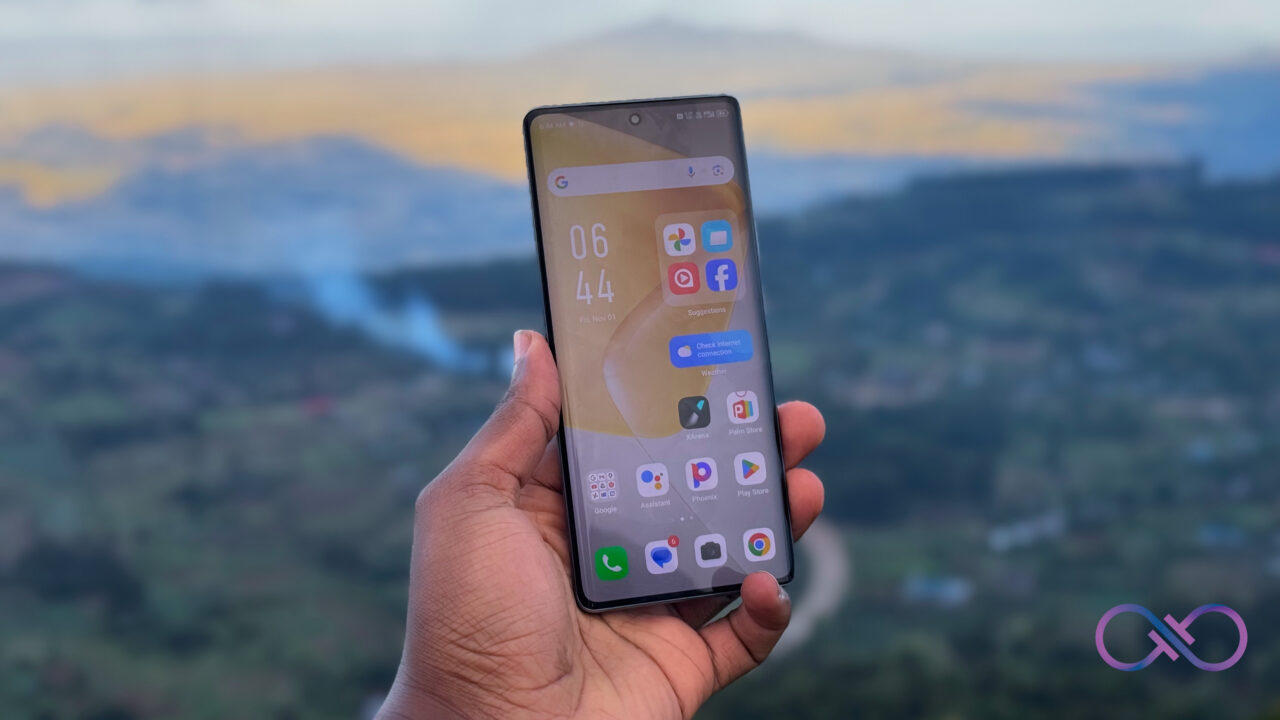
4. Front Camera – Selfie Quality vs. Lighting Innovation
- Infinix HOT 50 Pro+: 13MP with front-facing flash
- Xiaomi Redmi Note 14 4G: 20MP
For selfies, Redmi takes the win because of its higher 20MP resolution. However, Infinix includes dedicated front-facing lights, making selfies in low light noticeably better.
So if you take a lot of night-time selfies, the HOT 50 Pro+ might be the better choice.
5. Processor – Similar Performance, But the G100 Has the Edge
- Infinix HOT 50 Pro+: MediaTek Helio G100 (6nm)
- Xiaomi Redmi Note 14 4G: MediaTek Helio G99 Ultra (6nm)
The Helio G100 is the more powerful processor, but the difference isn’t huge.
Both phones will feel the same in daily usage—whether it’s social media, multitasking, or gaming. You won’t notice a major gap in speed, but the HOT 50 Pro+ does have an edge in performance.
6. RAM & Storage – Infinix Goes All-In, But Lacks Cheaper Variants
- Infinix HOT 50 Pro+: 8GB RAM (+8GB virtual), 128GB/256GB storage, microSD up to 1TB
- Xiaomi Redmi Note 14 4G: 6GB/8GB RAM, 128GB/256GB storage (UFS 2.2), microSD up to 1TB
Both phones offer expandable storage up to 1TB and have RAM expansion features.
However, Infinix only offers 8GB as the base RAM option. That’s good because you’re guaranteed a solid amount of RAM, but bad because there’s no cheaper 6GB variant—which would have helped with pricing.
7. Operating System & Updates – No Official Long-Term Commitment
- Infinix HOT 50 Pro+: XOS 14.5 (Android 14)
- Xiaomi Redmi Note 14 4G: HyperOS (Android 14)
Both phones run Android 14 with custom skins, and it comes down to personal preference. Neither Infinix nor Xiaomi offers an official update policy like Samsung’s 7-year commitment. So expect one or two major updates at best.

8. Battery – Similar Life, But Infinix Uses New Tech
- Infinix HOT 50 Pro+: 5000mAh, 33W wired charging, 10W reverse charging
- Xiaomi Redmi Note 14 4G: 5500mAh, 33W wired charging
Despite having a slightly smaller 5000mAh battery, the HOT 50 Pro+ lasts just as long as the Redmi Note 14 4G. Why? Infinix is using new silicon-carbide battery technology, which allows them to pack a large battery into a much slimmer device. Both phones offer fast 33W charging, so you won’t see a difference in charging speeds.
9. Connectivity – Infrared Blaster is a Bonus on Redmi
- Infinix HOT 50 Pro+: Wi-Fi, Bluetooth, NFC, USB Type-C
- Xiaomi Redmi Note 14 4G: All of the above + Infrared Blaster
Both phones have similar connectivity, but the Redmi Note 14 4G includes an infrared blaster, allowing you to control TVs and home appliances—a useful extra feature.
10. Audio – JBL Partnership vs. Headphone Jack
- Infinix HOT 50 Pro+: JBL-tuned speakers, no headphone jack
- Xiaomi Redmi Note 14 4G: Stereo speakers (Dolby Atmos), 3.5mm headphone jack
Infinix has partnered with JBL for sound tuning, so the HOT 50 Pro+ delivers great audio quality. However, Redmi wins here because it still has a 3.5mm headphone jack.
Final Verdict – Which One Should You Buy?
| Feature | Winner |
|---|---|
| Design & Feel | Infinix HOT 50 Pro+ |
| Display | Infinix HOT 50 Pro+ |
| Rear Camera | Tie (Infinix for video, Redmi for resolution) |
| Front Camera | Redmi Note 14 4G |
| Processor | Infinix HOT 50 Pro+ |
| Battery Life | Tie |
| Software | Tie |
| Connectivity | Redmi Note 14 4G (Infrared Blaster) |
| Audio | Redmi Note 14 4G (Headphone Jack) |
If you want the best display, premium design, and better video recording, Infinix HOT 50 Pro+ is the way to go. However, if you want a headphone jack, IR blaster, and better selfie camera, the Redmi Note 14 4G is a solid choice.



